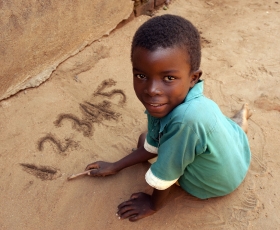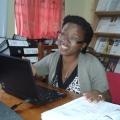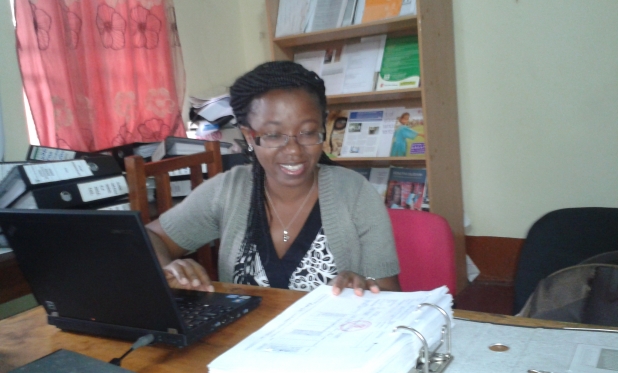Kemi, an experienced auditor (ACCA, IIA, CISA) was working in the banking sector when she contacted AfID; she was at a career-crossroads and wanted to move away from compliance in a corporate environment into a more challenging and rewarding international role in the charity sector. Kemi had lived and worked in a number of African countries whilst with Deloitte and was very aware of the need and transferability of her skills; this experience made her an ideal candidate for a permanent role at one of AfID’s international charity partners.
Kemi attended AfID’s volunteer workshop to gain more insight into the role of an accountant in the sector before applying for the position of Internal Auditor at Save the Children International. She was successful and took up her new position in January 2013. We caught up with Kemi to find out how her first year has gone.
Q: Why did you choose to work in the International Development sector? Was it difficult to get your foot in the door?
‘Previously I worked in the banking industry dealing with compliance on the sale of regulated product but I very much wanted to get back into auditing or accountancy which is my core competence. The thought that my work would help in development projects, while achieving my career objectives, was definitely a strong motivation for me.’
Breaking into the sector was not a difficult one. I believe being a trained accountant is a very much sought after skill which is easily adaptable within any organisation involved in economic activities. The main factor that helped me break in was passion and motivation. I had previous experience in the third sector – both paid and unpaid – which eased the entry process for me.
Q: Who are you working for now and where does your job take you?
‘I currently work for Save the Children International as an Internal Auditor. My work requires travelling to our offices in Africa, South America and Asia. In the last 8 months I have been to Sierra-Leone, Uganda, Senegal, Ethiopia, DR Congo, Haiti and (currently in) Indonesia’
Q: How does your current role differs to your last full time position?
‘My current role involves reviewing administrative and financial controls within country programs to assess if the management are effectively managing the risks of the business. I am able to form an opinion through discussions, observations and inspection of documents. At the end of the review, I write reports incorporating control gaps and give recommendations to management.
While my previous role was also investigative in nature, it was a very much a standardised and check-the-box kind of role. This is mainly because the organisation is a mature organisation with a relatively structured and stable process in place. Moreover, the business process was regulated leaving little space for discretion.
However, in the development sector, working in different countries meant difference business scenarios with a varying operating environment and context. Therefore, I learn something new during each audit.
Q: What would you say are the pros & cons of your decision to work in the ID sector?
‘The advantages for me are: ability to fulfil my career aspirations, increased learning opportunity (technical and cultural), satisfaction in helping to make a difference and enhanced career opportunities.
The downside is that it can be emotionally draining seeing the less privileged uncared for. In addition, spending a long period away from home also takes its toll from time to time.
Q: Have you found any specific experience from your commercial roles was particularly transferable?
‘Analytical thinking, interviewing and report writing skills were skills which came in handy from my previous experience. Team playing is also a strong quality to build trust with the country offices.
My accounting and internal control background also helped me to easily relate with the financial recording process and system as the fundamental concepts remained the same.’
Q: What would be your advice to other accountants considering a similar career change or looking to break into the sector?
‘Getting some experience through volunteering is a good idea because it demonstrates your interest in the sector, it also gives the much-sought-after sector experience which most employers are looking for, thus makes getting into the sector much more realistic. Because working in the charity sector comes with its merits and demerits, having a real experience via volunteering helps towards making that critical long-term decision required for career change.’
Q: Your work entails travel to remote and, sometimes, unsafe regions in the world; have you ever had greater access to places or people, or strange reactions as a result of being a woman?
Being a woman has not given me greater access than my male colleagues generally because my role is often seen as bringing solutions. However it is a different situation when I am perceived as an investigator or a fault finder. So I think in general, the focus is more on the role rather than the sex. I must say though that expats are often seen as having superior knowledge or solution and this seems to given them greater access to information and people. I have seen this happen in my current role.
Q: Do you think there are more barriers for a woman in the workplace if they relocate to work in a less developed country?
I need to say that being a woman may on the other hand be a limiting factor in some developing countries. Here good communication skills and collaborative skills come handy. I have not encountered this in my current role but while in practice, I have had to work with a team who would rather not work or take directions from me because I am a woman. I eased the conflict by setting the expectation and reminding them that we need to work together to achieve audit objective, also highlighting what is in it for them if this is achieved. The extent of barriers for women vary from country to country, from being covert to outright hostility; depending on how prevalent male dominance is in the country culture.
Q: What ‘do’s and dont’s’ would you give to women travelling to work overseas?
I suggest women conduct research on the country they intend to relocate to have a sense of career progression. Lack of acceptance often leads to frustration and ultimately, exits from the country.
There is need to respect culture and beliefs even if one does not believe in them. This includes dressing, greeting and addressing individuals acceptably. Observing and sometimes imbibing the culture improves acceptance.



 Name
Name